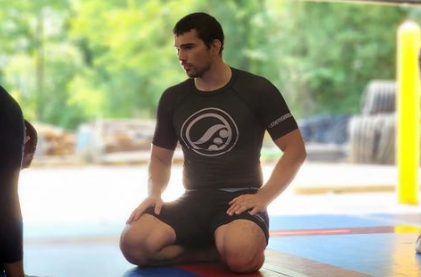‘The last year has been horrid’ – Andrew Wiltse opens up about mental health struggles
Daisy Fresh’s Andrew Wiltse spoke to Grappling Insider about his struggles with mental health and much more.
Elite black belt Andrew Wiltse hasn’t competed in over a year. Widely regarded as one of the sport’s best talents and most dangerous guard passers, the Daisy Fresh representative wasn’t out of competition due to a torn ACL or some other physical injury, but rather a months-long, medication-induced manic episode that wreaked havoc on his mental health.
Wiltse recently sat down with Grappling Insider to discuss his struggles with mental health, the fallout from the severe manic episode he experienced, and how he is returning to full health as he prepares to once again compete at the highest level.
Never shy about his opinions, Wiltse also touched on a variety of topics, including changes to the jiu-jitsu metagame, the new Daisy Fresh, his ideal ruleset for competition, greasing, and steroids in BJJ.
Check out the full interview below.
Wiltse says that 2022 was an incredibly difficult year, marked by a two-month manic episode followed by a deep depression:
“This past year has actually been one of the roughest years that I’ve had in my entire life. A lot of people missed out on the fact that I had this really public manic episode that happened, like 7, 8, 9 months ago, something like that. But it was actually a huge deal. I’ve never had my brain shattered in that way before. It just kind of tore me into pieces and I’ve been rebuilding since that point in time.”
The episode, he says, was triggered by mixing medications. But now that he has his mental health under control, Wiltse has returned to training and looks forward to competing soon:
“Now I’m starting to come back, now I’m feeling good. I’m getting in good shape and I’m starting to feel like I’m competition-ready, almost, and I’m getting ready to take a Who’s Number One [match] or something soon. But the last year has been horrid. 2022 was just not my year.”
The effects of Wiltse’s manic episode lasted well after it ended, sending him into depression for months:
“My manic episode was actually medication induced. I think without that I’ve been able to manage my bi-polar pretty well, I mostly just deal with depressive episodes. The manic episodes were not that big of a deal until that one in particular…
“The problem was, with manic episodes that are super bad, as high as you go is as low as you’re gonna go. And I went super high. I actually didn’t sleep for about a week. Genuinely, I did not sleep… I deteriorated rapidly. It turns out that you really do need to sleep. I hit such a high point in that manic episode that the depression after was crippling.”
Wiltse has returned to regular training with his long-time team, Pedigo Submission Fighting AKA “Daisy Fresh,” but is still taking things slowly as he recovers:
“I’m training every night at Daisy Fresh. I’ve missed a couple nights here and there, because I still don’t feel like I’m back at 100 percent mentally. It’s a little harder for me to jump into the swing of things this time than it has in the past after coming back from a mental health episode, but I still just attribute that to how bad the mental health episode was.”
Once notorious for its crowded space and old mats, Daisy Fresh has recently relocated to a new facility, decked out in brand-new mats and top-end amenities. Wiltse described the new gym:
“I think it’s a good vibe man. We got a sauna, we got a weight room now. We have more mat space upstairs than we did at the original Daisy Fresh. And we’ve got double the mat space downstairs. We’ve got visitors from all over the world there all the time… It’s so much fun because I get to roll with such a variety of people.”
Wiltse also spoke about a current hot topic in jiu-jitsu – steroid use:
“I would like to see extremely invasive steroid testing in jiu-jitsu. I mean, I want them to be able to come to your f****** house and test you randomly, that would be great. That would make me extremely happy…
“What I don’t want is to have athletes at lower belts, the kids that are coming up doing jiu-jitsu now, feel like they’re supposed to do it. I don’t want them to feel pressured to do it because they assume everyone else is doing it, which is what we have right now.”

